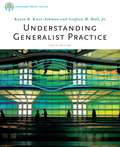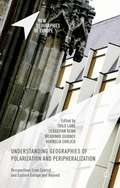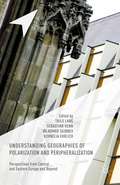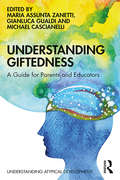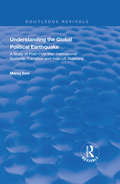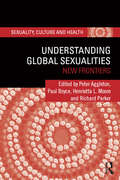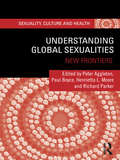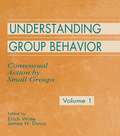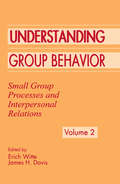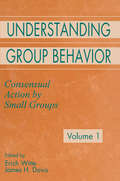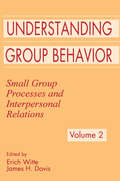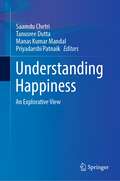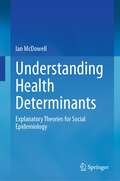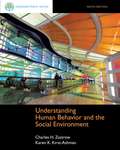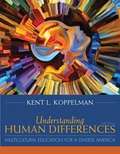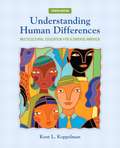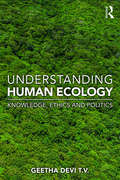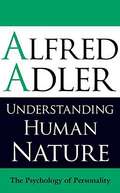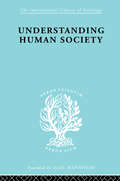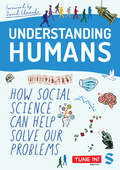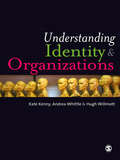- Table View
- List View
Understanding Generalist Practice (Sixth Edition)
by Karen K. Kirst-Ashman Grafton H. Hull Jr.Organized around the authors' coherent and cohesive Generalist Intervention Model, this introductory guide to generalist social work practice provides users with the knowledge and skills they will need to work with individuals and families, as well as the foundation to work with groups, communities, and organizations. It explores the links between micro, mezzo, and macro levels of social work practice and reflects the latest EPAS standards with empowerment and strengths perspectives for partnering with clients.
Understanding Geographies of Polarization and Peripheralization: Perspectives From Central And Eastern Europe And Beyond (New Geographies Of Europe)
by Thilo Lang Sebastian Henn Wladimir Sgibnev Kornelia EhrlichThis book presents a multifaceted perspective on regional development and corresponding processes of adaptation and response, focusing on the concepts of polarization and peripheralization. It discusses theoretical and empirical foundations and presents several compelling case studies from Central and Eastern Europe and beyond.
Understanding Geographies of Polarization and Peripheralization: Perspectives from Central and Eastern Europe and Beyond (New Geographies of Europe)
by Thilo Lang Sebastian Henn Wladimir Sgibnev Kornelia EhrlichThis book presents a multifaceted perspective on regional development and corresponding processes of adaptation and response, focusing on the concepts of polarization and peripheralization. It discusses theoretical and empirical foundations and presents several compelling case studies from Central and Eastern Europe and beyond.
Understanding Giftedness: A guide for parents and educators (Understanding Atypical Development)
by Gianluca Gualdi Maria Assunta Zanetti Michael CascianelliThis concise, accessible guide explores the different models behind the concept of giftedness, examining the criteria for evaluating and identifying gifted children, in order to provide a deeper understanding of the lives of children and young people with high cognitive potential. It offers practical advice to parents and teachers, highlighting common queries and misconceptions and presenting evidence-based suggestions for management methods. Key topics covered include the difference between being gifted and talented, how to identify a gifted child, neurological differences between gifted children and their peers, dealing with perfectionism, and the best ways to parent and teach a gifted child. Avoiding prescriptive rules, the authors emphasise the importance of knowing and understanding the individual child whilst utilising research around giftedness to promote the best possible outcomes. Illustrated with case studies of student and teacher perspectives, the book offers an inclusive perspective and practical strategies, whereby the development of individual potential is viewed not only as a way to promote the psychological well-being of the individual but also as an opportunity and benefit for society. Understanding Giftedness is essential reading for parents and caregivers, as well as practitioners in clinical and educational psychology, counselling, mental health, nursing, child welfare, public healthcare and those in education who want to help young people develop their talents and achieve their full potential.
Understanding Global Political Earthquake: Study of Post-Cold War International Systemic Transition and Indo-US Relations (Routledge Revivals)
by Manoj SoniPublished in 1998, this text presents two theoretical frameworks for understanding the post-Cold War international systematic transition, and Indo-US relational patterns. The frameworks explain the casual determinants of the current international systematic transition and foreign policy in a comparative perspective. It aims to provide tools not only to gauge the present transition but also to develop warning systems to decipher symptoms of any future international systematic transition of foreign policy behaviour.
Understanding Global Sexualities: New Frontiers (Sexuality, Culture and Health)
by Richard Parker Henrietta L. Moore Peter Aggleton Paul BoyceOver the course of the past thirty years, there has been an explosion of work on sexuality, both conceptually and methodologically. From a relatively limited, specialist field, the study of sexuality has expanded across a wide range of social sciences. Yet as the field has grown, it has become apparent that a number of leading edge critical issues remain. This theory-building book explores some of the areas in which there is major and continuing debate, for example, about the relationship between sexuality and gender; about the nature and status of heterosexuality; about hetero- and homo-normativity; about the influence and intersection of class, race, age and other factors in sexual trajectories, identities and lifestyles; and about how best to understand the new forms of sexuality that are emerging in both rich world and developing world contexts. With contributions from leading and new scholars and activists from across the globe, this book highlights tensions or ‘flash-points’ in contemporary debate, and offers some innovative ways forward in terms of thinking about sexuality – both theoretically and with respect to policy and programme development. An extended essay by Henrietta Moore introduces the volume, and an afterword by Jeffrey Weeks offers pointers for the future. The contributors bring together a range of experiences and a variety of disciplinary perspectives in engaging with three key themes of sexual subjectivity and global transformations, sexualities in practice, and advancing new thinking on sexuality in policy and programmatic contexts. It is of interest to students, researchers and activists in sexuality, sexual health and gender studies, especially those working from public health, sociological and anthropological perspectives.
Understanding Global Sexualities: New Frontiers (Sexuality, Culture and Health)
by Richard Parker Henrietta L. Moore Peter Aggleton Paul BoyceOver the course of the past thirty years, there has been an explosion of work on sexuality, both conceptually and methodologically. From a relatively limited, specialist field, the study of sexuality has expanded across a wide range of social sciences. Yet as the field has grown, it has become apparent that a number of leading edge critical issues remain. This theory-building book explores some of the areas in which there is major and continuing debate, for example, about the relationship between sexuality and gender; about the nature and status of heterosexuality; about hetero- and homo-normativity; about the influence and intersection of class, race, age and other factors in sexual trajectories, identities and lifestyles; and about how best to understand the new forms of sexuality that are emerging in both rich world and developing world contexts. With contributions from leading and new scholars and activists from across the globe, this book highlights tensions or ‘flash-points’ in contemporary debate, and offers some innovative ways forward in terms of thinking about sexuality – both theoretically and with respect to policy and programme development. An extended essay by Henrietta Moore introduces the volume, and an afterword by Jeffrey Weeks offers pointers for the future. The contributors bring together a range of experiences and a variety of disciplinary perspectives in engaging with three key themes of sexual subjectivity and global transformations, sexualities in practice, and advancing new thinking on sexuality in policy and programmatic contexts. It is of interest to students, researchers and activists in sexuality, sexual health and gender studies, especially those working from public health, sociological and anthropological perspectives.
Understanding Group Behavior: Volume 1: Consensual Action By Small Groups
by James H. Davis Erich H. WitteThese books grew out of the perception that a number of important conceptual and theoretical advances in research on small group behavior had developed in recent years, but were scattered in rather fragmentary fashion across a diverse literature. Thus, it seemed useful to encourage the formulation of summary accounts. A conference was held in Hamburg with the aim of not only encouraging such developments, but also encouraging the integration of theoretical approaches where possible. These two volumes are the result. Current research on small groups falls roughly into two moderately broad categories, and this classification is reflected in the two books. Volume I addresses theoretical problems associated with the consensual action of task-oriented small groups, whereas Volume II focuses on interpersonal relations and social processes within such groups. The two volumes differ somewhat in that the conceptual work of Volume I tends to address rather strictly defined problems of consensual action, some approaches tending to the axiomatic, whereas the conceptual work described in Volume II is generally less formal and rather general in focus. However, both volumes represent current conceptual work in small group research and can claim to have achieved the original purpose of up-to-date conceptual summaries of progress on new theoretical work.
Understanding Group Behavior: Volume 1: Consensual Action By Small Groups; Volume 2: Small Group Processes and Interpersonal Relations
by James H. Davis Erich H. WitteThese books grew out of the perception that a number of important conceptual and theoretical advances in research on small group behavior had developed in recent years, but were scattered in rather fragmentary fashion across a diverse literature. Thus, it seemed useful to encourage the formulation of summary accounts. A conference was held in Hamburg with the aim of not only encouraging such developments, but also encouraging the integration of theoretical approaches where possible. These two volumes are the result. Current research on small groups falls roughly into two moderately broad categories, and this classification is reflected in the two books. Volume I addresses theoretical problems associated with the consensual action of task-oriented small groups, whereas Volume II focuses on interpersonal relations and social processes within such groups. The two volumes differ somewhat in that the conceptual work of Volume I tends to address rather strictly defined problems of consensual action, some approaches tending to the axiomatic, whereas the conceptual work described in Volume II is generally less formal and rather general in focus. However, both volumes represent current conceptual work in small group research and can claim to have achieved the original purpose of up-to-date conceptual summaries of progress on new theoretical work.
Understanding Group Behavior: Volume 1: Consensual Action By Small Groups; Volume 2: Small Group Processes and Interpersonal Relations
by James H. Davis Erich H. WitteThese books grew out of the perception that a number of important conceptual and theoretical advances in research on small group behavior had developed in recent years, but were scattered in rather fragmentary fashion across a diverse literature. Thus, it seemed useful to encourage the formulation of summary accounts. A conference was held in Hamburg with the aim of not only encouraging such developments, but also encouraging the integration of theoretical approaches where possible. These two volumes are the result. Current research on small groups falls roughly into two moderately broad categories, and this classification is reflected in the two books. Volume I addresses theoretical problems associated with the consensual action of task-oriented small groups, whereas Volume II focuses on interpersonal relations and social processes within such groups. The two volumes differ somewhat in that the conceptual work of Volume I tends to address rather strictly defined problems of consensual action, some approaches tending to the axiomatic, whereas the conceptual work described in Volume II is generally less formal and rather general in focus. However, both volumes represent current conceptual work in small group research and can claim to have achieved the original purpose of up-to-date conceptual summaries of progress on new theoretical work.
Understanding Group Behavior: Volume 1: Consensual Action By Small Groups; Volume 2: Small Group Processes and Interpersonal Relations
by James H. Davis Erich H. WitteThese books grew out of the perception that a number of important conceptual and theoretical advances in research on small group behavior had developed in recent years, but were scattered in rather fragmentary fashion across a diverse literature. Thus, it seemed useful to encourage the formulation of summary accounts. A conference was held in Hamburg with the aim of not only encouraging such developments, but also encouraging the integration of theoretical approaches where possible. These two volumes are the result. Current research on small groups falls roughly into two moderately broad categories, and this classification is reflected in the two books. Volume I addresses theoretical problems associated with the consensual action of task-oriented small groups, whereas Volume II focuses on interpersonal relations and social processes within such groups. The two volumes differ somewhat in that the conceptual work of Volume I tends to address rather strictly defined problems of consensual action, some approaches tending to the axiomatic, whereas the conceptual work described in Volume II is generally less formal and rather general in focus. However, both volumes represent current conceptual work in small group research and can claim to have achieved the original purpose of up-to-date conceptual summaries of progress on new theoretical work.
Understanding Happiness: An Explorative View
by Tanusree Dutta Manas Kumar Mandal Saamdu Chetri Priyadarshi PatnaikThis book provides a comprehensive and enriching understanding of the construct of happiness from diverse perspectives. It provides readers with an overview of the issues, problems, and challenges related to well-being and happiness. The book is divided into three sections. It brings together researchers and practitioners from various disciplines, including psychology, sociology, and development studies. Each section includes chapters from leading academicians from across the world. The first section helps the reader understand happiness from a neuroscientific perspective and explores the relationship between happiness and subjective well-being. The second section of the book discusses the importance of building personal resources for happiness from a positive psychology point of view. The last section examines the importance of happiness in the workplace and suggests a sustainable development plan for happiness. It is a must-buy book for individuals nurturing critical thought and searching for a quintessential understanding of happiness. It presents a unique contribution to the literature with its multidisciplinary focus on specific topics.
Understanding Hate Crimes: Acts, Motives, Offenders, Victims, and Justice
by Carolyn Turpin-PetrosinoHate crimes and lesser acts of bigotry and intolerance are seen to be constants in today’s world. Since 1990, the federal government has published annual reports on hate crime incidents in the United States. While the reported numbers are disturbing, even more devastating is the impact of these crimes on individuals, communities, and society. This comprehensive textbook can serve as a stand-alone source for instructors and students who study hate crimes and/or other related acts. It invites the reader to consider relevant social mores and practices as well as criminal justice policies as they relate to hate crimes by presenting this subject within a broad context.
Understanding Health Determinants: Explanatory Theories for Social Epidemiology
by Ian McDowellThis book assembles a wide range of explanatory perspectives on social inequalities in health. Everywhere in the world, those with less advantage die younger and suffer more illness than the wealthy. Decades of research have documented this reality and yet we lack a comprehensive understanding of the mechanisms through which social circumstances ultimately influence the biological processes that lead to disease. Explanations have been proposed from various disciplines – economics, psychology, behavioral science, geography, and neuroscience – and each sheds light on parts of the overall process. But very few texts assemble these insights into an overall explanatory paradigm.Through a review of concepts and theories from a wide range of disciplines, the author outlines how these may be woven together to offer a more complete picture of how social influences 'get under the skin' to affect health and disease. As well as understanding individual health, the book assembles explanations for social disparities in health. It concludes with a proposal for a set of explanatory models that cross disciplinary boundaries. Topics explored include:Social Inequalities in HealthExplanation and Causal Models for Social EpidemiologySocial and Economic Theories to Explain Patterns of DiseaseBiological Pathways Linking Social Determinants to HealthTheoretical Models of Health BehaviorWork Environment and HealthSocial Networks, Social Support and HealthPositive Influences on Health: Coping and ControlThe Relationship Between Personality and HealthUnderstanding Health Determinants: Explanatory Theories for Social Epidemiology is a textbook for graduate students in epidemiology, health sciences, health policy, and psychology, as well as social science students who are studying health. It will also be of interest to general readers, and can serve as a reference for researchers in epidemiology and the health sciences who are planning studies of the social determinants of health. The book reviews theories that could be tested in such studies.
Understanding Human Behavior and the Social Environment (Cengage Learning Empowerment Series)
by Charles Zastrow Karen K. Kirst-AshmanZastrow and Kirst-Ashman's UNDERSTANDING HUMAN BEHAVIOR AND THE SOCIAL ENVIRONMENT, 10th Edition looks at the lifespan through the lens of social work theory and practice, covering human development and behavior theories within the context of family, organizational, and community systems. Using a chronological lifespan approach, the book presents separate chapters on biological, psychological, and social impacts at the different lifespan stages with an emphasis on strengths and empowerment. Part of the Brooks/Cole Empowerment Series, this edition is completely up to date and thoroughly integrates the core competencies and recommended practice behaviors outlined in the current Educational Policy and Accreditation Standards (EPAS) set by the Council on Social Work Education (CSWE).
Understanding Human Behavior and the Social Environment (Ninth Edition)
by Charles Zastrow Karen K. Kirst-AshmanZastrow and Kirst-Ashman's UNDERSTANDING HUMAN BEHAVIOR AND THE SOCIAL ENVIRONMENT looks at lifespan through the lens of social work theory and practice, covering human development and behavior theories within the context of family, organizational, and community systems. Using a chronological lifespan approach, the book presents separate chapters on biological, psychological, and social impacts at the different lifespan stages with an emphasis on strengths and empowerment. As part of the Brooks/Cole Empowerment Series, this edition is completely up to date and thoroughly integrates the core competencies and recommended practice behaviors outlined in the 2008 Educational Policy and Accreditation Standards (EPAS) set by the Council on Social Work Education (CSWE).
Understanding Human Differences: Multicultural Education for a Diverse America, 5th Edition
by Kent L. KoppelmanA clear, engaging look at the issues of diversity in 21st Century America, focusing on culture, the individual, and institutions. This popular text uses a stimulating inquiry approach to engage students in discussion and debate around the most critical issues of diversity in America.
Understanding Human Differences: Multicultural Education for a Diverse America, Fourth Edition
by Kent L. KoppelmanIn Understanding Human Differences,readers are introduced to sound research grounded in various behavioral and social sciences while featuring a stimulating inquiry approach to support reflection on issues of critical importance in multicultural education in today’s diverse society. The conceptual framework of the book focuses on three areas: culture, the individual, and institutions. Readers are encouraged to examine individual concerns; understand the cultural/historical contexts; and explore such areas as racism, classism, sexism, heterosexism, and ableism. Included is a focus on changes already achieved or that need to be implemented in schools and other areas of society to create a more just society.
Understanding Human Ecology: Knowledge, Ethics and Politics
by Geetha Devi T. V.This book examines the domain of human agency–environment interaction from a multidimensional point of view. It explores the human–environment interface by analysing its ethical, political and epistemic aspects – the value aspects that humans attribute to their environment, the relations of power in which the actions and their consequences are implicated and the meaning of human actions in relation to the environment. The volume delineates the character of this domain and works out a theoretical framework for the field of human ecology. This book will be a must-read for students, scholars and researchers of environmental studies, human ecology, development studies, environmental history, literature, politics and sociology. It will also be useful to practitioners, government bodies, environmentalists, policy makers and NGOs.
Understanding Human Nature: The Psychology of Personality (Psychology Revivals Ser.)
by Alfred Adler Colin BrettLong-regarded as the handbook of Individual Psychology, Understanding Human Nature provides an engaging introduction to Adler's key concepts including: inferiority and superiority complexes; life style; memories and dreams; love, marriage and children; and sexuality and sexual problems. Adler's holistic approach to the study of personality saw him challenge the dominance of Freud's thinking (his friend and colleague) and develop a truly innovative, and still highly relevant, method of psychoanalysis. A straightforward, clearly-written book, it shows the seminal thinking of a great mind and provides a basis to understand both Adler's unique theories and the development of twentieth-century psychology, in which his work has played such an important part.
Understanding Human Resource Development: A Research-based Approach (Routledge Studies in Human Resource Development)
by Jim Stewart Jim McGoldrick Sandra WatsonThis edited volume contains original chapters by some of the leading researchers and writers in HRD. It provides a definitive work on the design and conduct of research in HRD and identifies and examines the possibilities and limitations of particular methods and techniques. Emerging debates on the purpose, nature and practice and theoretical base of HRD are examined. Each chapter is structured with: * Statement of aims* Description of theoretical and empirical context^* Identification and examination of methodological issues* Description and evaluation of research design* Critical analysis and evaluation* Key learning points
Understanding Human Society (International Library of Sociology)
by Walter GoldschmidtPublished in 1998, Understanding Human Society is a valuable contribution to the field of Social Science.
Understanding Humans: How Social Science Can Help Solve Our Problems
by David EdmondsCompiling the best episodes of SAGE′s ′Social Science Bites′ podcast since its beginning in 2012, this pocket-sized volume is sure to inspire and provoke. With a foreword by David Edmonds, host of the podcast, this book will show you how social science can help to solve problems in today′s society. It is structured into sections on identity, learning, human behaviour, social change, and the unexpected, with each chapter offering the perspective of one of the most dynamic thinkers in the social sciences. Taking a multidisciplinary approach, Edmonds′ selection of interviews includes topics such as racial inequality, moral psychology, the pandemic, and the prison system. Interviewees include Sam Friedman, Professor of Sociology at LSE, Gurminder K. Bhambra, Professor of Postcolonial and Decolonial Studies at the University of Sussex, and Jennifer Richeson, Professor of Psychology at Yale University. This book will show you the range of voices in the social sciences today, and how this diversity is what is needed to grapple with the complexity of the issues we face.
Understanding Humans: How Social Science Can Help Solve Our Problems
by David EdmondsCompiling the best episodes of SAGE′s ′Social Science Bites′ podcast since its beginning in 2012, this pocket-sized volume is sure to inspire and provoke. With a foreword by David Edmonds, host of the podcast, this book will show you how social science can help to solve problems in today′s society. It is structured into sections on identity, learning, human behaviour, social change, and the unexpected, with each chapter offering the perspective of one of the most dynamic thinkers in the social sciences. Taking a multidisciplinary approach, Edmonds′ selection of interviews includes topics such as racial inequality, moral psychology, the pandemic, and the prison system. Interviewees include Sam Friedman, Professor of Sociology at LSE, Gurminder K. Bhambra, Professor of Postcolonial and Decolonial Studies at the University of Sussex, and Jennifer Richeson, Professor of Psychology at Yale University. This book will show you the range of voices in the social sciences today, and how this diversity is what is needed to grapple with the complexity of the issues we face.
Understanding Identity and Organizations
by Hugh Willmott Kate Kenny Andrea WhittleAn understanding of identity is fundamental to a complete understanding of organizational life. While conventional management textbooks nod to in-groups, cohesion and discrimination, this text offers instead a deeper, more nuanced understanding of why people, groups and organizations behave the way they do.<P><P> With conceptions of identity perhaps less stable than they have ever been, the authors make complex theoretical issues accessible to the reader through the use of lively examples from popular culture. The authors present an overview of the key issues, as well as an examination of cutting-edge research and topical forces currently re-defining identity, such as globalisation, the fair trade movement and online identities.<P> This text is a succinct, relevant and exciting overview of the field of identity studies as it relates to business and management and applied social sciences, an is an invaluable resource to undergraduate and postgraduate students of management on any course that has an identity component.
